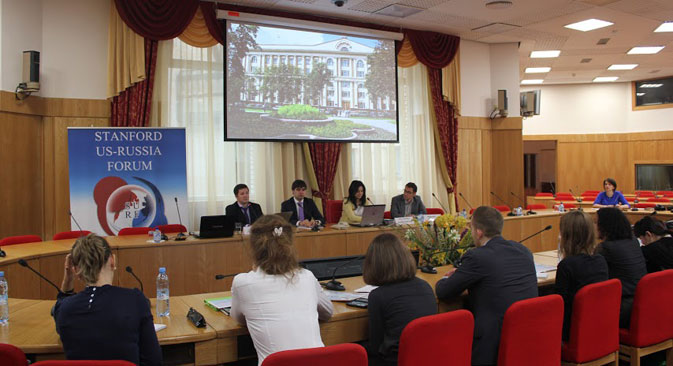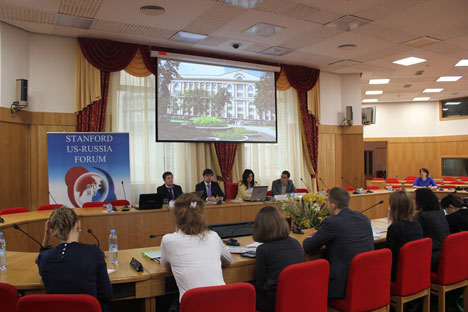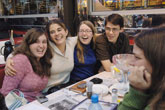SURFing the new wave in US-Russia relations

This year Stanford US-Russia Forum celebrates 5th anniversary. Source: SURF / Press photo
Five years ago, students from leading U.S. and Russian universities came together in a Moscow cafe to discuss a huge geopolitical issue: U.S.-Russia relations. This was following the Russo-Georgian war, after the deterioration of Russian-American bilateral relations and shortly before the official launch of the so-called reset. This is how the story of the Stanford U.S.-Russia Forum (SURF) began.
“We were in the right place and at the right time,” says one of its founders David Zokhrabyan. “We know that the key to making progress is providing opportunities for Americans and Russians to understand each other on a deeper level, and just two conferences a year couldn’t do that. We therefore decided to place collaborative research projects at the heart of SURF. These projects provide long-term opportunities for American and Russian students to work together toward a common goal.”

The forum brings together students from some of the world’s top universities. Photo: SURF / Press photo
Annually held in Russia and the U.S., the forum brings together students from some of the world’s top universities — Yale, Stanford, Harvard, University of Pennsylvania, University of California-Los Angeles (UCLA), University of California-Berkeley (UC Berkeley), Moscow State University (MGU), Higher School of Economics (HSE), Moscow Institute of International Relations (MGIMO), and others.
This year, SURF is celebrating its fifth anniversary. The first part of the conference took place on Oct. 8–12 in Moscow, bringing together 20 Russian and 20 American students who will be working on collaborative research projects over the next four months.
The project is expected to involve around 50 people, including student advisers and mentors. In April, students will travel to Stanford to present their findings and meet with high-profile experts, academics and politicians.
“I found out about SURF purely by accident: I was browsing one of Russia’s websites and, finally, came across the Stanford forum official page,” says Stanislav Budnitsky, a Higher School of Economics graduate who is currently working on a doctorate degree in communications at Carleton University in Ottawa, Canada.
“I am studying public diplomacy, and exchange programs like SURF are one of the most effective ways of public diplomacy,” Budnitsky says. “Most importantly, students from the American side have the chance to be exposed to Russian expertise and pundits. Likewise, when we Russian students go to Stanford, we will have the chance to hear the American experts, academics and their analysis, thoughts on U.S.-Russia relations — and that’s crucial.”
Indeed, John Bonilla, a U.S. officer from Stanford, did not know about U.S.-Russia relations before joining SURF. “I am a physicist and a mathematician, but necessarily a politician,” says Bonilla. “But this experience changed my perspective on U.S.-Russia relations. And it’s a great opportunity for everybody to do that.”
According to Ekaterina Markaryan, SURF president on the Russian side, organizing these kinds of conferences is very challenging and time consuming.
“First, you have to do a lot of fundraising, which is pretty competitive given the growth of interest in soft power and the increasing number of public diplomacy projects,” she says.
“This time, for example, our team did its best to get funding and scholarship from the Gorchakov Foundation for Public Diplomacy. Second, inviting experts is a pretty tricky thing, because all of them have a very tough schedule: They may promise to come, and reject shortly before the conference. That’s why you should to be as persuasive and resourceful as possible.”
This year, SURF students and officers met with the head of Renova and the Skolkovo Innovation Center, Viktor Vekselberg, as well as the president of the Massachusetts Institute of Technology (MIT), Edward Crawley, at the Skolkovo Innovation Center for the presentation of student startups on Oct. 12.
When asked about the implication of SURF for U.S.-Russia bilateral relations, Crawley says, “it is important to establish both these research connections.” Crawley also talked about probable intersections between SURF and Skolkovo.
According to him, Skolkovo is focused on creating innovation and moving science and technology toward commercialization of ideas, and collaborating with U.S. Universities may be fruitful.
Likewise, Vekselberg points out to the lack of U.S.-Russia collaboration in science and innovation. “There should be many more such formats and forums. The Stanford forum is a multi-channel potential of relations between professors, students, businesspeople. That’s why I wish it would focus on more specific things. We would like to step up the collaboration with Stanford.”
What results has Stanford U.S.-Russia Forum
achieved for five years? What challenges is it facing now? How will it tackle
these problems? Will
Skolkovo Innovation Center be able to find crosspoints with Stanford Forum?
Find the answers in the full article published at Russia Direct.
All rights reserved by Rossiyskaya Gazeta.
Subscribe
to our newsletter!
Get the week's best stories straight to your inbox
.jpg)
